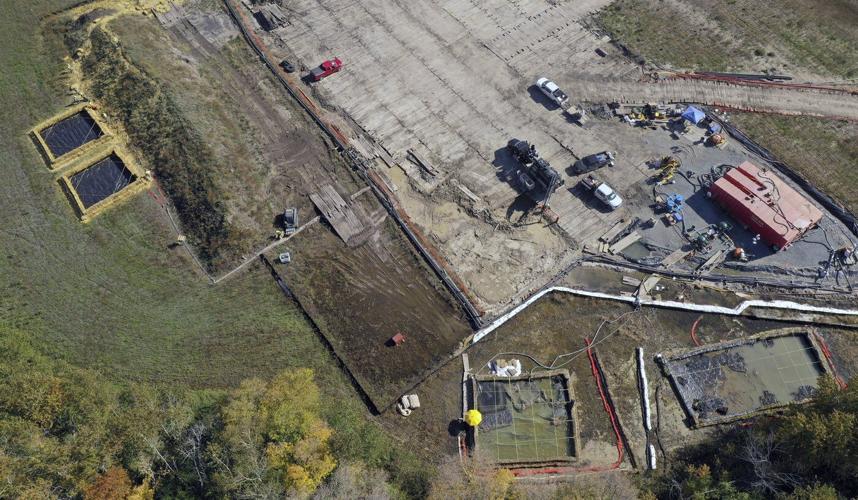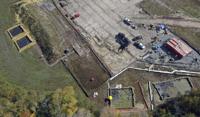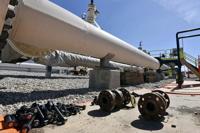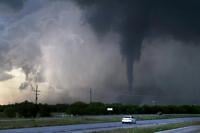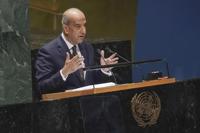The U.S. Army Corps of Engineers has decided to fast-track permits for building a protective tunnel around an aging Enbridge oil pipeline that runs beneath a channel connecting two Great Lakes, stoking environmentalists' fears that the project will escape scrutiny, damage the sensitive region and perpetuate fossil fuel use.
The move comes after President Donald Trump issued an executive order in January declaring that the U.S. has become too dependent on foreign energy sources. The order mandates that federal agencies identify energy infrastructure projects for expedited emergency permitting from the U.S. Army Corps of Engineers and the Environmental Protection Agency.
The corps designated the tunnel project on Line 5 as an emergency under the order late Tuesday. The corps had initially planned to . Corps officials were vague during a conference call with reporters Wednesday morning about how quickly the process may move forward.
The Detroit District's regulatory chief, Shane McCoy, said that the timeline will be “truncated" but didn't elaborate beyond saying no steps would be skipped and the process will result in “a very legally defensible, very well-informed decision.”
Multiple groups lined up to criticize the fast-track decision Wednesday, including the Sierra Club, environmental law firm Earthjustice and the Great Lakes Business Network, a coalition of businesses that works to protect the Great Lakes with sustainable business practices.
“The only energy ‘emergency’ the American people face is Trump's efforts to disregard clean air and water safeguards in order to rush through dirty, dangerous fossil fuel projects,” said Mahyar Sorour, director of the Sierra Club's Beyond Fossil Fuels Policy.
Enbridge spokesperson Ryan Duffy said in a statement Wednesday that Line 5 is “critical energy infrastructure” and the tunnel project is designed to “make a safe pipeline safer.” He noted that Enbridge first began applying for permits five years ago.
Enbridge says pipeline is safe, but tunnel would protect it better
The pipeline runs through northern Wisconsin into Michigan's upper and lower peninsulas before terminating in Sarnia, Ontario, in Canada. Enbridge has used the pipeline since 1953 to transport crude oil and natural gas liquids between Superior, Wisconsin, and Sarnia. It currently moves about 23 million gallons (87 million liters) a day, according to Enbridge. Part of the pipeline runs beneath the Straits of Mackinac, a channel that connects Lake Michigan and Lake Huron.
Company officials maintain the aging pipeline is structurally sound. But concerns about a potentially catastrophic spill in the straits that could contaminate Lake Michigan and Lake Huron have been mounting since 2017, when Enbridge officials revealed engineers had known about gaps in the pipeline's coating in the straits for three years. Fears of a spill escalated in 2018 after a boat anchor damaged the line. The company reached an agreement in 2018 with then-Michigan Gov. Rick Snyder's administration to encase the line in a protective tunnel.
Enbridge wants to replace the section of pipeline beneath the straits and encase the segment in a new, 3.6-mile (5.8-kilometer) tunnel bored beneath the lakebed, according to an Army Corps summary of the proposal. An initial cost estimate in 2018 put the project’s price tag at $500 million.
Environmentalists push back in court
Environmental groups, tribal nations and Democrats have spent the last five years filing lawsuits to remove the line from the straits. in February that for the tunnel were properly issued. Separate lawsuits from Attorney General Dana Nessel and Gov. Gretchen Whitmer seeking to void the easement that allows the pipeline to run beneath the straits are still pending in state and federal court.
The lawsuits notwithstanding, Enbridge needs only approval from the Army corps and the Michigan Department of Environment, Great Lakes and Energy before it can begin tunnel construction.
Tribes refuse to consult after fast-track decision
Seven Native American tribes consulting with the corps about the tunnel project's potential impacts on their treaty rights have ended any discussions beyond impact on historic properties after learning the project would be fast-tracked. Tribal leaders said in a March letter to the corps that the corps has failed to include the risk of a spill in its analysis and has disregarded the project's effects on climate change.
Katie Otanez, regulatory project manager for the corps' Detroit District, said Wednesday that the corps continues to consult with 20 other tribes. She did not elaborate.
Pipeline reroute in Wisconsin bogged down in court
Enbridge is embroiled in a separate legal battle over Line 5 in Wisconsin. About 12 miles (19 kilometers) of the line runs across the Bad River Band of Lake Superior Chippewa's reservation. The tribe sued in 2019 to force Enbridge to remove the line from the reservation, arguing it's prone to a spill and easements allowing the company to operate on the reservation expired in 2013. A federal judge in 2023 gave the company three years to get the pipeline off the reservation.
Enbridge has proposed a 41-mile (66-kilometer) reroute around the reservation. seeking to void state construction permits for the project and joined several other groups in challenging the permits through the state Department of Natural Resources' contested case process.
___
This story has been updated to correct that the pipeline carries 87 million liters of crude oil and natural gas liquids daily.

